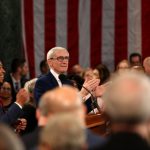public art or urban eyesore?
By Raymond Johnson One of the happiest developments in recent years is the explosion of sidewalk seating at restaurants and cafés in Milwaukee. It signals a renewed commitment to public life, or at least as close as we are able to achieve it in an age in which we are always and everywhere shopping. It seems nearly every establishment that is able has put a few tables out, even the Famous Cigar Shop on Brady St., so that smokers can enjoy their purchases immediately. Brady, perhaps the city’s most public street, has been literally transformed in recent years by the number of establishments with sidewalk seating. All this sidewalk seating, however, is not without drawbacks. The placement of private seating on sidewalks in part co-opts the public realm. Restaurants and cafés with seating on the sidewalk are making money in this public space. Such taking demands something be given back, a responsibility too few uphold. With great seating comes great responsibility. First and foremost amongst these is a requirement to keep the sidewalk passable. Legally, sidewalk seating may not encroach upon a wheelchair user, whose right to sidewalk use is unquestioned. Additionally, seating should allow for the passage of two people shoulder to shoulder holding hands. This distance, four to five feet, is about the width of a residential sidewalk. Couples shouldn’t have to break handholding to bypass outdoor grazers. That on too many of Milwaukee’s commercial streets (Kinnickinnic Av., Center St., Water St.) this would be nearly impossible, signals dysfunctional urban design. Recent violators have included Rock Bottom Brewery on the Riverwalk and Hooligan’s on North Ave. Rock Bottom has been the most serious offendor. In the past, it has placed tables along the narrow right of way east of the restaurant’s parking lot, although this practice seems to have stopped. Rock Bottom still packs its tables onto their main Riverwalk space, blurring the public passage and making those strolling by feeling as if they are walking through a dining room rather than on a sidewalk. Hooligan’s infringements have been less premeditated. Some days there is plenty of space, others not enough even for wheelchair users. Of course it is not only the establishments that are responsible for maintaining the public way. All of us who enjoy outdoor seating must remain cognizant of the amount of space we leave to passersby. This is simply a requirement of living in and using a dense urban environment. The other primary responsibility placed upon establishments utilizing sidewalk seating is aesthetic. Many establishments treat this public responsibility callously. They have simply gone to the local hardware store and purchased the ubiquitous plastic chairs and tables found on every backyard deck from New Berlin to Menomonee Falls. They are fine for that use, but inappropriate for urban sidewalks. There are too many of these places to mention them all. Sidewalk seating as public art. Others are trying harder. Hartter’s Bakery on Prospect Ave., and Cempazuchi’s and on Brady St. feature colored translucent resin slat […]
Aug 1st, 2003 by Vital ArchivesCherrywine is (Almost) Fine
Cherrywine is (almost) fine. Hey, I just wanted to let you know that there is a typo in the last line (from June Record Reviews). It should read, “Bright Black is AN excellent debut album…” Other than that, it is an excellent review. -Thanks, Amy Redevelopment: a tough topic. Dear Matt & Jon Anne, I have been meaning to write a note of appreciation for your June Developing City article on Walker’s Point re: artists, “gentrification,” etc. I thought it was a good piece, but I see you got some heat from one reader. She made some good points and posed some good questions. It’s a tough topic to do justice to all sides — the pros and cons of redevelopment, revanchist city neighborhoods, etc. Keep going for it though. -Best, Dan Knauss Kiteboarding is cool. Dear Vital, Thanks for the excellent piece on kiteboarding in the June issue. While it’s true that Milwaukee’s little stretch of Lake Michigan ain’t the best for boarding, there are many up and coming spots within a few hours drive. Thanks for taking the time to mention them, and for going straight to the horse’s mouth: Corey Roesler is the godfather of the sport, and no true kiteboarding overview would be complete without him. -Sincerely, Mark Naumansch A deeper understanding of Israel. James A. Henderson’s anti-Israel diatribe in the July Vital Source should not go unanswered. Israel’s occupation of the West Bank and Gaza is not “illegal.” These areas were taken by the Israeli armed forces in 1967, during a war of defense that was imposed on it by the Arabs under the leadership of Egyptian President Nasser. The Arabs were not fighting on behalf of the Palestinian people, but rather to end the State of Israel, as they stated very openly. The capture of these territories was not part of Israel’s initial war plan, which was merely to end the immediate threat to its existence. However, it was hoped that the territories would provide a buffer from future attacks until peace treaties could be signed, and would in fact be traded as part of a land-for-peace settlement. That is exactly what happened in the treaty signed with Egypt in 1978. Except for a very radical fringe, Israelis of every stripe are willing to see the creation of an independent Palestinian state as long as Israel’s security can be guaranteed. One can question the vigor with which the current government has pursued this, but there is no question that it is Arab rejectionism — once again — which has been the main stumbling block, most recently at Camp David in 2000. Israel’s military actions in the West Bank and Gaza have been reactions to attacks on its citizens, and while Palestinians have died, Israel has not targeted innocent civilians. By contrast, that is precisely the tactic that Hamas, Islamic Jihad, Fatah and other Palestinian organizations have followed. “Killing and slaughter, violence and carnage” are not Israeli policy. Perhaps the apparent silence of the peace […]
Aug 1st, 2003 by Vital ArchivesThe Bad Plus
By Jeremy Saperstein The Bad Plus These Are The Vistas Columbia www.thebadplus.com Although it could be easily dismissed as a calculated and cynical move, I find it hard to dislike any band that presents jazz-trio covers of Nirvana’s über-punk anthem “Smells Like Teen Spirit” and Blondie’s “Heart Of Glass”, especially one who does them as well The Bad Plus. Yep, it would be easy, but the Bad Plus have the audacity to be better than hack musicians trying to milk the last drops dry from alterna-madness. Really, all the trio (Reid Anderson on bass, Ethan Iverson on piano, David King on drums) is doing is to continue in the tradition of jazzbos from the 40s and 50s, who would put their own stamp on popular songs of the day (John Coltrane’s take on “My Favorite Things” comes to my mind, for example). Indeed, there are some other fine songs on this disc, like the airy “Keep The Bugs Off Your Glass And The Bears Of Your Ass” (which actually made me think of the open road even before I read the C.B.-inspired title) and “1972 Bronze Medalist” (which evokes weird visions of Peanuts characters competing in the Munich Olympics). The Bad Plus have made a daring bid. Time will tell if they can back it up. I’m hoping they can.
Aug 1st, 2003 by Vital ArchivesThree Chords and Some Hard Questions
By Richard Walters These are arguably the most difficult and frightening times within memory to be an American citizen. Not since the days of Kent State have we confronted so disturbing a landscape, in which our role as citizens is so much in question, or in which our moral compass seems to have been misplaced along with our cell phones. For the current crop of middle-agers, the political context of that time, thirty or forty years ago, was much simpler, much more comprehensible. There was one big issue (the war), one big bad guy (the government), and one big solution (love one another/give peace a chance/power to the people). It wasn’t so much a question of what should be done, as much as what shouldn’t: stop the war, and the rest would fall into place. Today, though, the problem is that no clear dragon presents itself for beheading. Rather, we confront a wearying mass of issues with no apparent solution, until a single galvanizing event, the Trade Center tragedy, is offered to us as a focal point. With it we are given “them” to hate and blame it on, and our government embarks on its response abroad, with wars in Afghanistan and Iraq, and domestically, with the PATRIOT Act, electronic surveillance on an unsurpassed scale, suspension of civil rights, and the death penalty at every turn. Questioning the government’s leadership has become unpatriotic in the eyes of many, and anything less than unqualified support for the wars has become nearly treasonous. Where have all the voices gone? Against this backdrop, the voices of protest and activism in popular music are largely silent. Unlike the days of the Great Folk Scare, and the politicization of rock in the 70s, today we hear virtually nothing of questions or doubts in the musical media. The amalgam of Clear Channel/Sony/Dreamworks and other media powerhouse corporations has provided a platform on today’s focus-group formula radio for such performers as Toby Keith and Darryl Worley, both embarrassingly right wing. The difference between the two, both mainstream country chart toppers, is merely stylistic — Worley’s maudlin, jingoistic sycophancy for anything in desert camouflage, and Keith’s redneck, bullying “we’ll plant a boot in your ass” aggression. As a friend recently observed, “The lines between Country Music Television, NASCAR and the WWF are getting pretty blurry, even when I haven’t been drinking.” He could have thrown Fox “News” and “reality television” into the mix as well. So what do we have for voices, not even on the left, but simply other than the hard right? Well, there’s Bruce Cockburn, doomed however unjustly to being typecast as incessantly beating the drum about the Third World. There’s Ani deFranco, with her (some would say) over-shared personal growth. And then there’s Steve Earle. Enter Steve Earle. For those who have been locked away in a monastery for the last few years, Steve Earle is quite possibly the finest songwriter at work in popular music today, and certainly the most controversial. In September […]
Aug 1st, 2003 by Vital Archives"I know what I want to do for the rest of my life."
By John Hughes What do the Pfister, the Milwaukee Athletic Club, Comet and Fuel Cafes, the Hi-Hat, Sanford’s, Trocedaro, St. Bessie’s, The Social, Sol Fire, Sendik’s and the 300 Club at Miller Park all have in common? You might guess, with a group as wide-ranging as that — nothing. But the answer is Wild Flour Bakery, which bakes wholesale for all of the above. Because of that, they all have Greg and Dolly Mertens, the owners of Wild Flour, in common. You might say Greg and Dolly are the leaven in Milwaukee’s yeast. So much the better for us. During a recent visit to the couple’s beautiful, Mayor’s Design Award-winning bakery on 28th and Lincoln, Dolly shows me with beaming pride the stripped original woodwork in the 80 year old shop, the original laminated bread cases, the original tile floor. She shows me the new, hand-built brick oven, which turns 600 pounds of dough into delectables on slow days, 850 pounds on busy ones. She informs me that there are two other bakeries under the Wild Flour name; one in New Berlin, and one baking pastries and croissants at Grand Avenue Mall. She takes me on a tour of her sparkling kitchen, bustling with hard-working Latinos from the neighborhood, and speaks with strength, conviction, and enthusiasm, her brown eyes bright. “Ten years ago I bought a loaf of bread,” she says. “And when I bit into it, I said to my husband, ‘I know what I want to do for the rest of my life.’ He said, ‘what is that?’ I said, ‘be a baker.’ He just said, ‘I’ll support you.’ He’s a honey.” She smiles with megawatt authenticity and leads me back to the front of the store, where employee Rosa is sweeping with vigor and cheer. “I was the 13th of my parents’ 14 kids,” she continues. “And I was raised on a farm in central Wisconsin. I spent a lot of time in the kitchen with my mother. I became an expert dishwasher, I’m great at that. And I learned from my mother the art of sharing. I learned that bread is not so much to feed your belly, but your soul. I learned that when you bake for others, you are sharing not so much food but yourself. And we heal one another through food. So, now I’m doing that, and I love what I do.” Greg is, as Dolly reports, a honey, with an easy smile, gentle voice and approachable spirit. He was one of eight children, but his father died when Greg was 11, and he watched his mother raise the children by herself. He informs me that he decided to marry Dolly when he was 14 and she 13, during the 1950s in rural Wisconsin. The wedding had to wait several years, but they’ve now been married for over three decades. These are people who know the value of hard work and community, pulling together with other “good, honest people” to make something […]
Aug 1st, 2003 by Vital ArchivesBritta Phillips & Dean Wareham
By Jeremy Saperstein Britta Phillips & Dean Wareham L’Avventura Jetset http://www.jetsetrecords.com There’s an old joke about a guy who passes on his review of a buffet to a friend. “The entrees all tasted the same, the desserts weren’t much better than Jell-O with fruit cocktail and the sodas were flat,” he says. “Sounds pretty awful. I bet you won’t be going back, huh?” asks his friend. “Oh, I’m going again tonight!” “But, I don’t understand. You said the food was awful.” “It was, but there’s so much of it!” This release from Luna frontman Dean Wareham and bass player Britta Phillips makes me think of that joke, with a major difference: this is good. It’s just not that substantially different from a Luna effort, which — if you like Luna — ain’t a bad thing. Arrangements are slightly quieter without Luna guitarist Sean Eden, but he’s nicely replaced here by lusher instrumentation, and Phillips’ lead turns at the microphone make me want to hear more. Nary a review of Dean Wareham’s work gets written without mentioning his clever songwriting, and this one can’t be different. Favorite couples include “In 1984/I was hospitalized for approaching perfection” and “They make it so you can’t shake hands/When they make your hands shake” (from “Random Rules”). The band gets additional points for including another cover The Doors “Indian Summer.”
Aug 1st, 2003 by Vital ArchivesMichael Seidel’s Neon Golden journey of out time
By Michael Seidel It was Gothenburg. Truly it was, but whenever arrows of time are lobbed at the dartboard of that day, my mind gets tyrannical, wiping out the reality of place. It could have been anywhere: Anywhere International Airport. That’s it. Or at least we’ll pretend it is. It started like this: an ultra-modern, passenger-choked shuttle bus slid out of the city. Along the featureless outlying countryside, dusk was raining down, incrementally blacking out depth of field until the landscape was reduced to my own face staring back at me. I dug the Discman out of my side bag, sifted through my volumes of MP3s and eventually settled on the bleepy, lush electronic sounds of The Notwist’s Neon Golden. I’d heard the record before. Months earlier, I was doing a stint of couch surfing and a generous friend offered his room to me while he was away from home for several months. Along with his room came his CD collection, which was massive, and teeming with records I’d never heard before. Everyday was an odyssey of discovery, and it was wonderful. Neon Golden had gotten a few spins and I thought it was great, but its significance hadn’t yet surfaced. That would happen at Anywhere International Airport. We trudged deeper into what can only be described as “the boonies.” Seemingly out of nowhere, landing lights seared through the dark empty space outside. The shuttle came to a halt, we gathered our things and got off. The hour was a hellish hullabaloo of passports being rifled for, suitcases being dropped onto scales, sundry tongues clashing and competing. For me, all of that was muted to nothing more than tangible action. Sure, I caught snippets in the segues between tracks, but for the most part, it was all over-arched by Neon Golden. So in that way, on that night, that record became my anthem of transition. For me it somehow sonically exemplified the feeling and experience of transitory life. Over the next few months, I’d listen to it in narrow, pot-holed back alleys; on coaches with faltering suspension systems; on turbulence-plagued budget planes; sprawled out on the mite infested sheets of hostel beds, listless and longing. It gave form to the uncontrollable tremble of vague expectation. It was my empathetic conspirator in homelessness and motion. In the course of all this moving about, the surface of the CD got dinged so severely that it’s now unplayable. Though I have heard it a few times since I returned to my sedentary domestic life, I have not made the effort to obtain a new copy of my own. I still feel that it’s one of the greatest records I’ve ever heard — it’s just that it now feels out of context: its significance is trapped in my past, when life felt indistinct, boundless and new.
Aug 1st, 2003 by Vital Archives



















